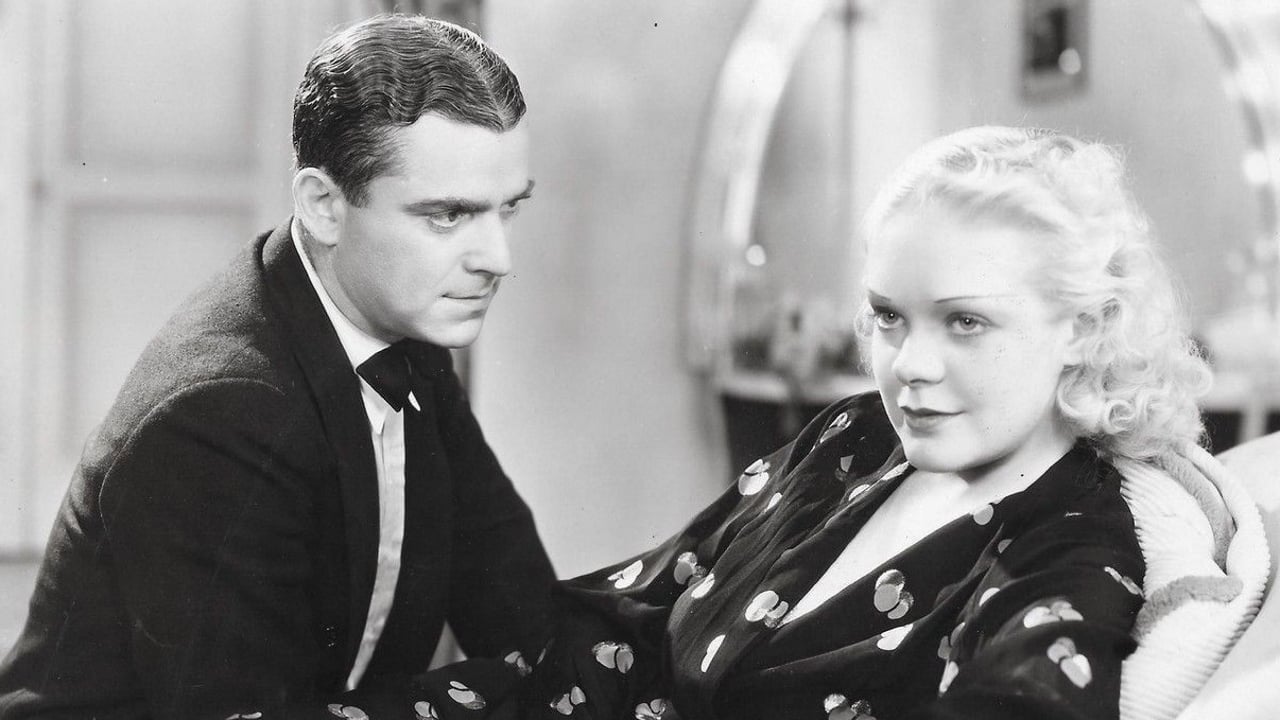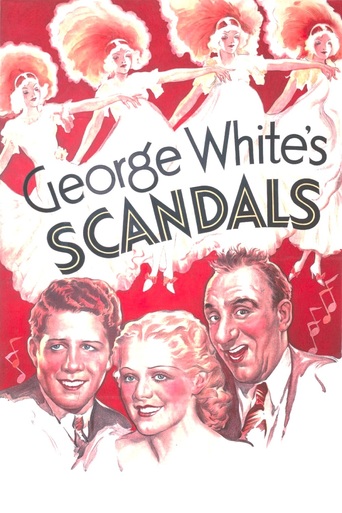

the audience applauded
... View MoreLack of good storyline.
... View MoreI wanted to like it more than I actually did... But much of the humor totally escaped me and I walked out only mildly impressed.
... View MoreWhile it is a pity that the story wasn't told with more visual finesse, this is trivial compared to our real-world problems. It takes a good movie to put that into perspective.
... View MoreAt just 80 minutes, this has about 15 minutes of plot and over an hour of sketches, songs and a talented group of performers bringing it all together. The film starts with a sold-out performance of the "Scandals" with Mr. George White himself selling tickets at the box office (standing room only, of course...). Then out comes Alice Faye to sing her first big hit on-screen, "Oh You Nasty Man", a delightfully huge and audacious production numbers. I could have done without the chorus line of moppets repeating this song, thrown in as if they were in hiding from "Annie's" Miss Hannigan. If you thought the chandelier girls in "Show of Shows" and the human harps in "Fashions" were enough to make any mother nervous, wait until you see Mr. White's curtain! And if you thought Al Jolson "Goin' to Heaven on a Mule" was the epitome of bad taste, think again. That spot goes to Jimmy Durante, repeating a bit of his old "Scandals" number "That's Why Darkies Were Born". Young black chorus girls allowed themselves to have dummies of black field workers carrying them around on their back, and a huge mammy rolls in, hiding "pickaninny" chorus girls with similar black children underneath her skirt. This jaw-dropping number offers every tacky stereotype ever used in a minstrel show which could be one reason that Fox Classics hasn't added this to its list of released titles, instead releasing the 1935 version which is audacious but certainly not offensive.What there is as far as storyline involves leading lady Alice Faye being in love with leading man Rudy Vallee while he dates scandalous society girl Adrienne Ames. Co-stars Cliff Edwards, Durante and Dixie Dunbar scheme to give the "Scandals" a finale it will never forget. Edwards (paired with Dunbar) is hysterical in a "Scenes From a Marriage" sketch called "So Nice!" which shows a couple from their honeymoon through old age, and the three men get together for a big funny production number called "Every Day is Father's Day". The romantic ballads are strangely dull, but there's a cute little sextet of the three men and their women gallivanting around town to "My Dog Loves Your Dog". One number all of a sudden tosses the lyrics on screen as a chorus girl jumps from word to word, pretending to be a bouncing ball. As a musical film with story, it lacks interest, but as a revue, it is a lot of fun, much like the "Scandals" were when they came along to rival the "Ziegfeld Follies" when our grandparents (more probably great grandparents) were youngsters.
... View MoreWhat a wacky funny glitzy mega musical from Fox in early 1934. The WB-Busby Berkeley films sure spawned major studio competition to out style each other with with glamor and dance, and this revue movie with a terrific cast is a genuine big musical event. Paramount already had the awesome MURDER AT THE VANITIES and Universal unleashed their hideous MOONLIGHT AND PRETZELS and MGM ran up DANCING LADY. So GEORGE WHITE'S SCANDALS is another Wonderbar/King Of Jazz nightclub theater revue of styled steppin' and pre code naughtiness. Gorgeous 18 year old Alice Faye in her big debut is a star on the spot, Spunky 16 year old Dixie Dunbar sings up a storm with Ukulele Ike and they add Jimmy Durante for raucous comedy blather. All very funny and often inventively spectacular ...and with a ghastly black-face number poking fun at Jolson's Going To Heaven On A Mule number from WONDERBAR. There is enough faux Berkeley spangle and angle and clever special effects to keep anyone like me who loves this deco pre code musical period happy. There is a bouncing ball song using showgirls instead of a ball, a terrific "You Nasty Man' song of rude lyrics, and even a tiny tot Mae West gig with a 5 year old Shirley Temple in the chorus. Mad fun and very lavish, this is a good scandal (even a dog act!) and easily explains why there was a 1935 and 1945 sequel.
... View MoreUnlike Florenz Ziegfeld who died before MGM could properly enshrine his memory on film with The Great Ziegfeld, Ziegfeld Girl, and The Ziegfeld Follies, his rival George White wasn't about to wait until he was beyond caring. White produced two versions of his famous scandals for Fox and the film is interesting because it's a chance to see a Broadway review, a type of show now relegated to piano bars. It might have really been something had White hired Busby Berkeley for the dance numbers. Then again he probably knew that those films like the ones Berkeley did at Warner Brothers would be remembered for him and not White even with his name in the title.White appears in this and looks every inch the dapper man about town and former hoofer himself. But George White's Scandals suffers from two drawbacks. The first is a rather silly backstage plot involving a romantic triangle of Scandals performers Rudy Vallee and Alice Faye and society débutante Adrienne Allen. The story in fact was written by White himself. It would have been a far better film had he done an introduction prologue like William Powell as Florenz Ziegfeld in Ziegfeld Follies with White playing himself.Rudy Vallee in fact did appear on stage in George White's Scandals of 1931 where he introduced Life Is Just A Bowl of Cherries and a song that did better as a revival in 1943 than when it first came out, As Time Goes By. Alice Faye at this time was a female vocalist hired by Vallee to appear with him and his Connecticut Yankees orchestra and was involved with him romantically. This was her film debut and she gets the best song in the score, Oh You Nasty Man.Jimmy Durante and Cliff Edwards also appear in George White's Scandals and Edwards has a good number with him comparing his trouble with women with that of Henry VIII. Unfortunately Durante's big number involves the second reason why George White's Scandals isn't shown that often. Durante has a number where he spoofs fellow entertainer Al Jolson. It's not just that Durante dons the black-face which he would have to do to imitate Jolson, but then White had the bad taste to back him with a big chorus of singers and dancers, boys and girls, all in black-face doing one of those Mammy numbers.Despite a frivolous plot and bad taste, George White's Scandals deserves to be remembered for the debut of Alice Faye, one of the best musical stars Hollywood ever produced.
... View MoreThe ineffable Alice Faye made her film debut in this rousing backstage extravaganza, an interesting assembly of Broadway revue, comic sketches, songs, and dancing, in which she played an aspiring singer Kitty Donnelly and her romance with Rudy Valle. Although the movie is loaded with big-scale Busby Berkeley-inspired production numbers, its chief virtue is to watch and be mesmerized by Faye's glorious singing, her distinctive contralto voice.This is the movie where Faye sings "Oh, You Nasty Man" -- one of her most cheerfully lurid (though not necessarily the best), songs. Other songs and numbers include "So Nice", "Every Day's a Father's Day", "Following in the Mother's Footsteps", "Sweet and Simple", "Picking Cotton", and "The Man on the Flying Trapeze".Audiences applauded Faye's vivacity, and the movie made her an instant musical star. Up until her 1936 musical, "Sing, Baby, Baby", Faye really looked like a Jean Harlow-ish platinum blonde with pencil eyelashes. A year later she starred in a follow-up, "George White's 1935 Scandals" - also worth seeking out, if only for Faye's singing.
... View More